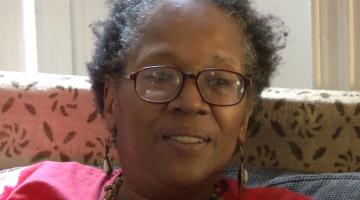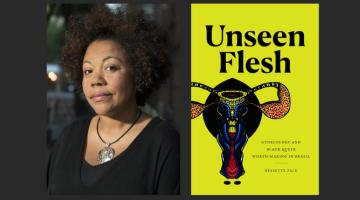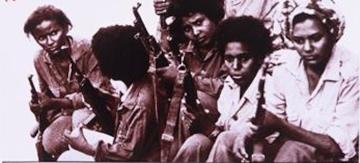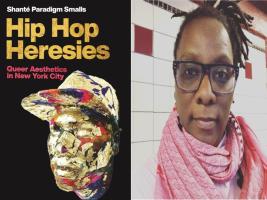In this series, we ask acclaimed authors to answer five questions about their book. This week’s featured author is Eric A. Stanley. Stanley is Associate Professor of Gender and Women's Studies at the University of California, Berkeley. Their book is Atmospheres of Violence: Structuring Antagonism and the Trans/Queer Ungovernable.
Roberto Sirvent: How can your book help BAR readers understand the current political and social climate?
Eric Stanley: In Atmospheres of Violence, I argue that racialized anti-trans/queer violence is foundation to, and not an aberration of, western modernity. This insistence pushes back against the idea that these forms of harm are simply the phobic eruptions of individual people--- an analysis I argue hides the structuring antagonism of the settler state.
To this end, I hope that the book helps us think against the idea that trans/queer freedom can be found within an assimilationist agenda. Indeed, while the drive toward inclusion is offered as the only way out of the nightmare world we know, its path leads us back into the dense space of nospace, while blaming us for our inability to survive. My other wish for the project is that, even within this seeming totality, that we know there have been and continue to be ways to escape modernity’s lockdown. In other words, people are already doing the beautiful work of fashioning what we want and need and so our task, I believe, is to intensify and collectivize that disruptive celebration.
What do you hope activists and community organizers will take away from reading your book?
This book was, in a material since, written through struggle. This is to say that anything of use I might have to offer I’ve learned from organizing with other people. I do, however, also want other abolitionists to feel affirmed by the project, I think that’s necessary. We too often downplay the pleasure that can be found in confirmation, however provisional; it’s something we don’t often get to feel. In this way, I hope the book offers sustenance for the hard work of destroying that which is destroying us.
I also want the book, in whatever small way, to open space for an antiauthoritarian trans/queer analysis that understands the state form as the poison it has always been. Throughout the text, I resist taking the inevitability of the state to be self-evident. Further, if much of our work delineates the various ways the state harms, how might we think and act beyond it?
As I catalogue, one of the effects of LGBT formal equality, which we might trace from the Stonewall uprising to our current moment, is the brutal reduction of our demands and the dreams that help them come to be. We don’t just want lower rents, we want the end of private property, we are not simply organizing for a decrease in the police budget, we want their total abolition as well as the abolition of the social that can bear their existence. Our desire is not for parliamentary representation and the traps it sets, we want the end of the settler state that wills death as the promise of life.
We know readers will learn a lot from your book, but what do you hope readers will un-learn? In other words, is there a particular ideology you’re hoping to dismantle?
I hope readers can un-learn our attachment (myself included) to the idea that what is currently offered is all that is available. Pragmatism, again and again, trains us that the “lesser of two evils” is the most we might anticipate. Under the current order, this might be the case. However, what we must also notice is that in our work to undo the anti-Black and anti-trans violence of the world we inhabit, another will come to be in its ashes. As artists and activist Tourmaline affirms, “It’s easy to be free.” I think this is an important antidote to the scarcity that the state, along with its various partners, including many nonprofits and political parties, distributes. This is perhaps a long way of saying that we live in abundance; there is already more than enough housing, but its kept empty by speculators, already enough food but it’s destroyed under the controls of racial capitalism, already enough time to rest, but its horded by those who have never labored. How might our demands change if we stopped accepting their lie as our truth?
Who are the intellectual heroes that inspire your work?
I continue to learn from trans/queer people that have been organizing in some of the most unlivable spaces, including solitary confinement, under brutal military occupation, in the precarity of houselessness. They can weave hope and hopelessness, not through a dialectics of transformation that offers them an eventual out, but because it’s the condition of their access to what might be called life. Most of them are unknown beyond the work and they wish to keep it that way. This is not to say that they inspire me simply because of their ability to perceive, but because of how they string together chances toward something else, which is to say how they theorize, even when, and perhaps most clearly when survival seems impossible.
There are, of course, also several more recognizable names cited throughout the text. From Fantz Fanon and Dora Silva Santana to CeCe McDonald and Lauren Berlant, they all, in radically divergent ways, offer us escape plans.
In what way does your book help us imagine new worlds?
Against modernity’s teleology that tells us that incrementalism will lead us toward the world we want, my book suggests a nonlinear version that knows destruction can also be a form of generativity. Further, rather than this disruptive generativity only belonging to a mythological future, it’s already here. The ungovernable, those that live in and as refusal, are among our guides. Their unruly genealogies, their theorizations of life outside of humanism’s lockdown remain as pedagogies for getting free. It is our task, then, to build with them, and to sharpen the contradictions so that the colonial regime—the cis-normative state—might fall. It is only then that those cast out might join, not to resuscitate the vestiges of the human, but to make forms of life that are not predicated on violence’s endurance. Or, as was asked in the streets of the George Floyd uprisings: is another end of the world possible?
Roberto Sirvent is editor of the Black Agenda Report Book Forum.



















